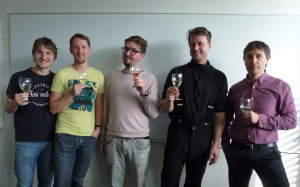Fourfold joy in Loschmidt Laboratories
A scientist’s dream! An event that happens once every 384 years! And the immense joy of all involved, the humility and respect for the work done. All of this is embodied in the success of the scientists from the Loschmidt Laboratories of the Faculty of Science of Masaryk University and the International Clinical Research Center (ICRC) in Brno. Manuscripts of four of them were all accepted in one day for publication in prestigious journals Nature Catalysis, ACS Catalysis, Analytical Chemistry and Computational and Structural Biotechnology Journal.
Mountaineers climb peaks, athletes break records, artists create masterpieces. For scientists, publishing articles in peer-reviewed journals is a core part of their work. In doing so, they spread awareness of their research, get feedback, develop collaborations with like-minded colleagues, and move the research forward. The most prestigious journals are those that are peer-reviewed and have a high impact factor, i.e. a value reflecting the average citation rate of all articles published in a journal over a certain period. Impact journals are ranked within their fields according to various metrics and are divided into four quartiles. The best ones are in the first quartile.
This elite group includes all the journals in which Martin Marek, Zbynek Prokop, Jan Velecký and Jan Mičan from Loschmidt Laboratories have managed to publish. Jan Velecký, for whom the acceptance of his first-authored article was a condition for the completion of his doctoral studies, wittily compared it to the milestones of a person’s first smile, first word, first day at school or first A or F grade at school. His colleague Michal Vašina, who has also recently enjoyed publication in the internationally recognised journal Chem Catalysis, likened the process of publishing a paper to the aging of wine. It happens that scientists have to rewrite and refine an article for several years before their “gran reserva” is accepted for publication.
Specifically, the accepted manuscripts describe the catalytic mechanism of the enzyme luciferase, the improvement of plastic-degrading enzymes by protein engineering, a microfluidic platform for monitoring enzymatic reactions, and the development of a new database for predicting the effect of mutations on protein solubility.
In his congratulatory message on social media, Prof. Petr Slavíček from the University of Chemistry and Technology in Prague calculated that with the current scientific performance of the team, the probability of 4 papers being accepted in prestigious journals at the same time is 0.09%, and we can therefore expect a similar phenomenon again in 384 years. We congratulate all the authors and wish them to break the statistics and celebrate more similar achievements soon.
Celebrating the success of the research teams, 11/11/2022 – from left Michal Vašina, Jan Velecký, Jan Mičan, Zbyněk Prokop, Martin Marek


